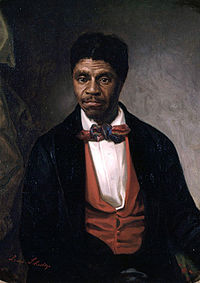Dred Scott
Dred Scott (circa 1799 – September 17, 1858) was an enslaved African American man in the United States who unsuccessfully sued for his freedom and that of his wife and their two daughters in the Dred Scott v. Sandford case of 1857, popularly known as the "Dred Scott Decision." The case was based on the fact that although he married a free black woman named Harriet while he was in Minnesota, and although he resided on free soil for 4 years, and although he attempted to buy his own freedom, Dred Scott had lived with his slave owner, Dr. John Emerson, in states and territories where slavery was illegal according to both state laws and the Northwest Ordinance of 1787, including Illinois and Minnesota (which was then part of the Wisconsin Territory). The United States Supreme Court decided 7–2 against Scott, finding that neither he nor any other person of African ancestry could claim citizenship in the United States, and therefore Scott could not bring suit in federal court under diversity of citizenship rules. Moreover, Scott's temporary residence outside Missouri did not bring about his emancipation under the Missouri Compromise, which the court ruled unconstitutional as it would improperly deprive Scott's owner of his legal property.While Chief Justice Roger B. Taney had hoped to settle issues related to slavery and Congressional authority by this decision, it aroused public outrage and deepened sectional tensions between the northern and southern U.S. states. President Abraham Lincoln's Emancipation Proclamation in 1863, and the post-Civil War Thirteenth, Fourteenth and Fifteenth amendments nullified the decision.
Personal facts

| Birth date | January 01, 1799 |
|---|---|
| Birth name | Sam Scott |
| Birth place | |
| Date of death | September 17, 1858 |
| Place of death |
Search
Dred Scott on Wikipedia
External resources
- http://caselaw.lp.findlaw.com/scripts/getcase.pl?court=US&vol=60&invol=393
- http://digital.wustl.edu/d/dre/chronology.html
- http://digital.wustl.edu/d/dre/index.html
- http://digital.wustl.edu/legalencodingproject/index.html
- http://markshurtleffauthor.blogspot.com
- http://www.afrigeneas.com/forum/index.cgi?noframes;read=55268
- http://www.loc.gov/rr/program/bib/ourdocs/DredScott.html
- http://www.nps.gov/jeff/historyculture/freedom-suits.htm
- http://www.sos.mo.gov/archives/resources/africanamerican/scott/scott.asp
- http://www.thedredscottfoundation.org